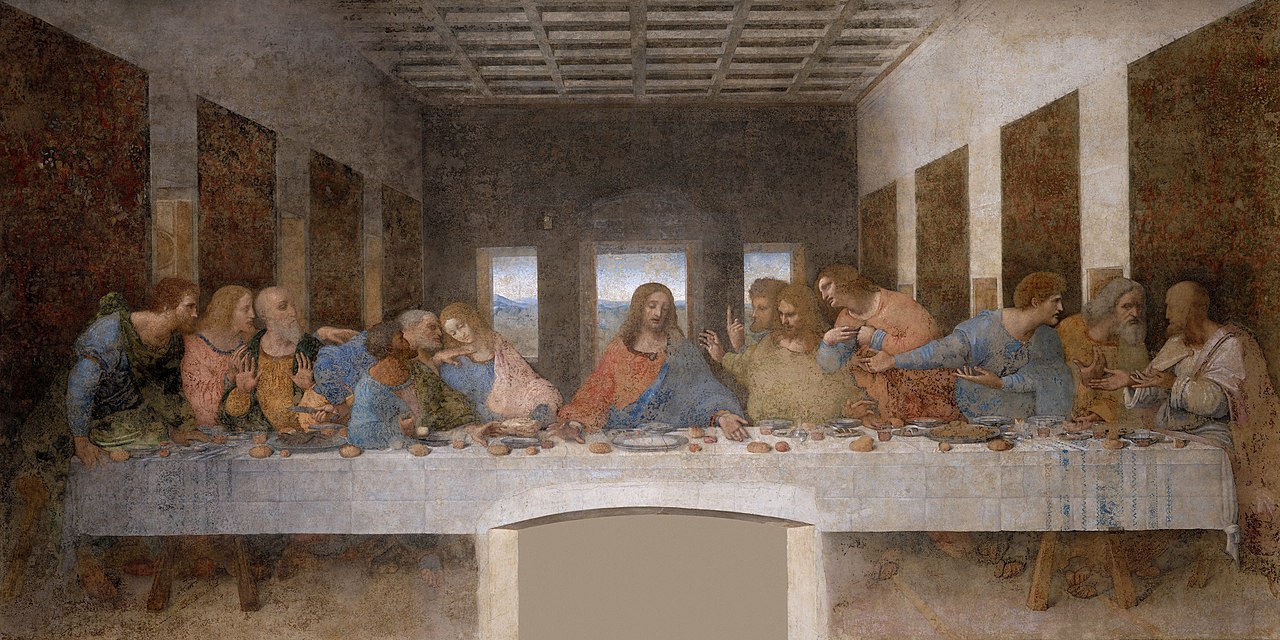Whatever else one can comment about Da Vinci's high renaissance aesthetic choices, the title of his famous painting, the Last Supper is an utter misnomer. It was neither a supper, nor the last meal Jesus ate with His apostles. Of course, the title has a certain accuracy of intention--Jesus and his disciples did, in fact, eat an evening meal and it was, in fact, the last recorded ingestion of nourishment our mortal Lord took in before the vinegar sponge on the cross and then His death. Instead, what I'm pointing to is that calling it a mere "last" supper drains all of the significance of the event. The meal was so much more than a social gathering with food and its function did mark the end of something, but only to inaugurate something new.
First, while not precisely the modern version, this began as what the Jewish apostles in attendance thought of as a seder--a Passover meal full of symbolism and covenant renewal. Since the time of Moses, the Hebrews were commanded to hold their covenantal identity as their highest, to integrate cyclically repeated religious rituals as markers of national togetherness under a God of liberation. This "meal" was a highly metaphorical performance in which music, scripture, and specially prepared tokens were literally incorporated--put into the body--to become physically one with the covenant individuals, all in unity. It faced both backwards and forwards chronologically, reminding the Jews of the miracle of the Exodus by which they emerged from slavery as a nation and as a covenant people and pointing them forward to the final miraculous liberation from the slavery of sinful conditions at the last day.
Secondly, while this was the performance of a longstanding religious event, and was the "last" Passover prescribed by Elohim, its function was less about an ending than a beginning. It was also the initiation of an alteration of the ritual and a reframing of its significance. It was training for the disciples in the new procedures of the sacrament. Thinking of it that way makes the social conclusions Da Vinci wants your eyes to draw from his busy and lengthy table, with side-conversation and even disorder, seem less apt. But even the food elements must be reconceived. Rather than focusing on the meat of a blemish-free and innocent animal slain, whose blood was symbolically painted on the doorframes of the obedient as a mark for the destroying angel to pass by, Jesus focused on the wine as the symbol of His atoning blood. Rather than focusing on the urgency with which the nation of Israel had to prepare its meal in the symbol of the unleavened bread, Jesus focused on the brokenness of the pieces to signify his freely offered mortal flesh.
Finally, the covenant the Lord made with Moses and the Hebrews was that He would redeem them. The seder symbols were all directed toward the hope this redemption brought. But, as is often the temptation, many thought of fidelity to tradition as the purpose, rather than covenant renewal. Their myopic insistence on the rearview mirror prevented these from preparing their hearts through repentance, from enjoying the windshield full of purpose-filled vistas of the eternal destination that a redemptive prayer in the Garden of Gethsemane and a redemptive sacrifice on the cross were driving them toward. The apostles, enthralled by both conversation and the spirit of the ritual were learning something new, however--that taking the emblems of Christ's sacrifice (which they hadn't yet witnessed, and therefore could only retroactively make sense of) made the group one, and made each individual one with Christ in a commandment-keeping, name-taking, always representing way. They performed to themselves and to the all-seeing God they worshiped that they were willing--willing to take upon them His name, to keep His commandments, and to always remember Him with the kind of active remembrance that imbues all of their actions with His imprint.
And let's also keep in mind the nature of the new commandment itself. He laid out for them, alongside His promise to send the Comforter as a constant companion in fulfillment of the covenant relationship that they submitted their will to take upon themselves that they must love even as He loves.
In describing that love, the King James Version, among many others, makes a curious choice of translation from the Greek. A god can perhaps have a greater love, but "greater love hath no man that this," the Savior who was about to do just that said to those gathered, "that a man lay his life for his friends" (John 15:13). He immediately qualified the term defining the receivers of the benefit of that life laid down in the next verse, with the phrase "Ye are my friends if you do whatsoever I command you," and then gave the commandment to love "one another" (John 15:17). In each of the iterations of the word "friends," the translators had an alternative for the Greek philon: beloved.
I don't know about you, but for me, a friendship can range from a minor acquaintance to an intimate partnership. It has to go beyond business, and it doesn't rise to family, except maybe metaphorically. It can mean something banal, and yet something good but not ultimately important, something fulfilling when close and yet can have distance and lower gradations. It seems less apt to me than beloved.
Beloved, on the other hand, can't exist without the word love. It's filled with choice and affection, and communicates clearly the radiance of the heart. Friends are not always loved ones, but loved ones are always family. We are children, metaphorical sheep, who the Father and Shepherd protect, gather, and feed in safe pastures. The relationship between the Savior and those He redeems is not mere camaraderie, but utterly intimate knowledge and embrace--it is one of knowing our sin, uniquely feeling the full weight of its eternal consequences, and taking us into the outstretched arm of His love, which is His power, despite it.
And we are His beloved when we do what He says not out of some blind or perverse pleasure He takes from control, but rather out of the joy of discovering, as a parent does a child, that learning to behave as He does, learning self-control as He exudes, unlocks our own joys and liberties. Conformity is not the goal of the Creator, but oneness in Him sparks the only true diversity: eternal progression.
May each sacrament meeting fill you with His love, because you've prepared for it through repentance, and expand your hope and faithful walk, approaching, in as great an increment as our mortal limits allow, His life more abundant. May every teacher's preparation, priest's blessing, and deacon's passing of the sacred aspects of His remembrance--the symbolic bread and water--evacuate your sin, and prepare you for the indwelling of the Spirit. May Easter week's new covenant make you one with Him, beloved, and ready to love one another.


No comments:
Post a Comment